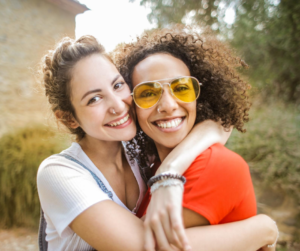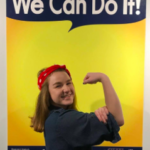 It’s time to put our differences aside in honor of the International Day of Friendship today, July 30.
It’s time to put our differences aside in honor of the International Day of Friendship today, July 30.
Many of us feel separated from others for a variety of reasons, including political ideologies, interests and appearance, for example.
We choose friends who are similar to us and we grow more similar after interacting more. We then may find ourselves in echo chambers, in which we only encounter opinions that enforce our own. We only hear one perspective to an issue, may ignore facts that support other perspectives or believe false or incomplete evidence.
But the International Day of Friendship, introduced by the United Nations in 2011, encourages us to engage in reconciliation and understanding with other people. It encourages us to not only reconnect and spend quality time with our friends, but to connect with others with whom we’ve had disagreements or differ from culturally. It’s a time to celebrate relationships that promote peace, happiness and unity; it’s a time to celebrate both the ways we’re different and the ways we’re alike.
Poet and activist Maya Angelou backs this up, saying, “We are more alike, my friends, than we are unalike.”
We all share aspects of common humanity in which we grieve, worry and even hope. We all experience loss, rejection and fear. We all want to feel loved, be successful and find ways out of the dark.
But at the same time, seeing these ways in which we’re alike can be difficult; we’re different in many strong, exhausting ways too. In fact, 77 percent of us believe America is politically divided. We shouldn’t push ourselves too hard in dealing with people who have vastly different and even harmful beliefs — self-care is crucial, especially this year when the world seems to be crumbling.
While connecting with others who are different is hard, we can experience deep connection in community and vulnerability with those people too.
Storyteller and shame researcher Brené Brown discusses these topics in her talks and books. In an interview with Forbes, she said this: “We’ve sorted ourselves into factions based on our politics and ideology. We’ve turned away from one another and toward blame and rage. We’re lonely and untethered. And scared.”
She continues to say that a likely factor in driving that division is our fear of vulnerability, of criticism, of pain, of not being enough.
Brown believes that if we want to make meaningful change, we have to be willing to interact with those who are different from us. “We’re going to have to learn how to listen, have hard conversations, look for joy, share pain, and be more curious than defensive, all while seeking moments of togetherness,” she said.
However, our intentionality doesn’t end with choosing to have a conversation with someone who believes differently than us. In addition, we have to create cultures where people feel safe, “where their belonging is not threatened by speaking out and they are supported when they make the decision to brave the wilderness, stand alone and speak truth… all while maintaining civility,” Brown said.
Being vulnerable with others in this way will benefit us all. Brown believes that “Vulnerability is the birthplace of love, belonging, joy, courage, empathy and creativity.”
Opening up and sharing how we feel won’t be easy, but we will find connections that we didn’t know existed with other people. We’ll find another sense of belonging and love, in which we can understand new viewpoints and create meaning in new, joyful ways.
One way we can learn about, support and connect with people who differ from us is through learning how to be an ally to people with marginalized identities. Further, we can learn about how identities can intersect and compound a person’s experience with the world.
For example, women, people of color, people with disabilities and people who are LGBTQIA+ are more likely to be discriminated against, deal with mental and physical health challenges and even be murdered. For example, they’re more likely to contract COVID yet less likely to receive adequate health care. In addition, they have longer-lasting mental illness symptoms and barriers to mental health services. And plenty of murders have occurred recently due to white supremacy and sexism, including Breonna Taylor, whose murderers haven’t been arrested yet, and Vanessa Guillén.
It’s important for us — especially those of us who don’t have those identities — to learn more about what those people struggle with and how we can help, without asking them to perform emotional labor.
The International Day of Friendship is about appreciating and incorporating more diversity and inclusion. While this is especially celebrated and enforced on this day, it’s important that we engage in this work much more often.
Below are some ways we can learn more and help. Keep in mind that this list of identities and ways to help is not all-encompassing.
Marginalized Identities, Generally
- Attend mental health ally trainings, such as Embody Carolina’s on eating disorders and the National Alliance on Mental Illness’ (NAMI) on mental health first aid
- Read about how people with marginalized identities are less likely to get adequate COVID care
- Support shows such as “Superstore” on Hulu that have a diverse cast and talk about the issues related to those diverse identities
- Take Harvard University’s Implicit Bias Test
Women
- Donate to Women AdvaNCe
- Read articles about women’s issues
- Attend events at NC State University’s Women’s Center
People of Color
- Watch shows like “Dear White People” on Netflix to see examples of experiences Black people have that white people don’t
- Donate to the Black Lives Matter movement
- Read educational books on racism and white privilege
People with Disabilities
- Donate to The Arc of North Carolina
- Read educational books about people with disabilities
- Read the Center for Disease Control’s (CDC) information about the different facets of life people with disabilities have to handle
People who are LGBTQIA+
- Donate to the LGBT Center of Raleigh
- Attend a Safe Zone training
- Advocate for gender-neutral bathrooms in your workplace
This International Day of Friendship and in the days ahead, let’s celebrate both how we are different and how we’re alike. Let’s initiate difficult but important conversations. Let’s educate ourselves on the barriers minorities face. Let’s write a card to our friends who mean a lot to us, and attend cultural celebratory events when social distancing isn’t necessary anymore. Let’s care for our friends a little extra and be open to making new friends, even with those who disagree with us. Let’s spread the love.
 Ashley Broadwater is a recent graduate of UNC-Chapel Hill, where she studied Public Relations in the Hussman School of Journalism and Media. She’s passionate about mental health, body positivity, relationships, Halloween and Dad jokes.
Ashley Broadwater is a recent graduate of UNC-Chapel Hill, where she studied Public Relations in the Hussman School of Journalism and Media. She’s passionate about mental health, body positivity, relationships, Halloween and Dad jokes.

There are no comments
Add yours